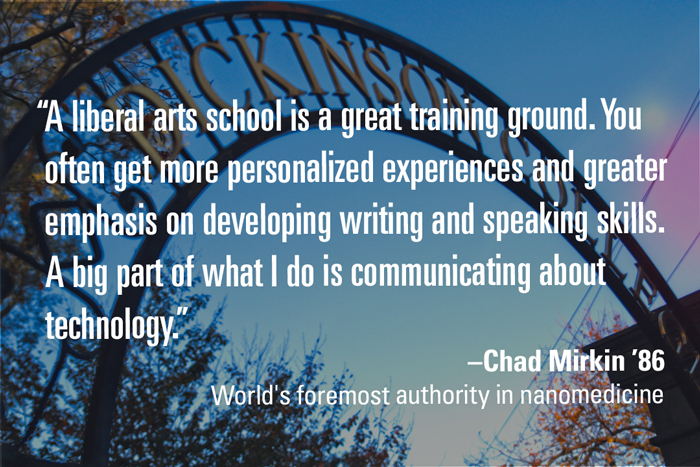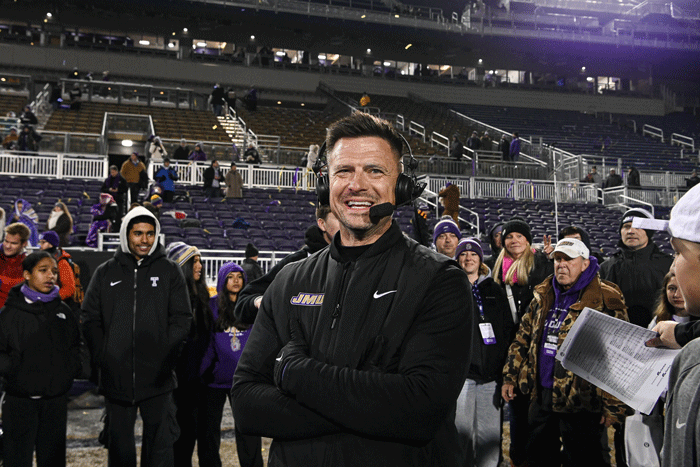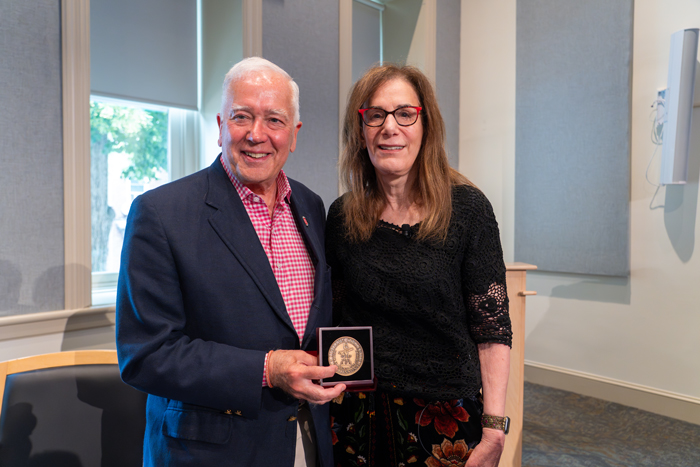
Remember when people actually used to question the value of the liberal arts? “What can you do with a liberal-arts degree?” the naysayers would naysay. “How is a liberal-arts degree going to prepare students for the job market?” others would ask into the void.
In retrospect, it feels like they may as well have been questioning if the Earth is really round.
Recent studies show that one in 12 of the nation’s CEOs is a liberal-arts graduate, among them luminaries such as Howard Schultz (Starbucks), Susan Wojcicki (YouTube), Bob Iger (Disney), Kenneth Frazier (Merck) and our own Stephen Smith ’92 (L.L.Bean) and Young Park '87 (GeneOne Life Sciences).
And of course a liberal-arts degree can lead graduates to places other than corporate America, such as into the arts and media, law and government, and science and medicine, as a small sampling. Or how about Silicon Valley? Look at what Forbes has to say:
“Throughout the major U.S. tech hubs, whether Silicon Valley or Seattle, Boston or Austin, Tex., software companies are discovering that liberal arts thinking makes them stronger.”
In the end, it’s pretty simple:
Writing well, thinking critically, separating fact from distortion and understanding human behavior aren’t just necessary skills for success in college and career—these foundational elements of the liberal arts are also vital to success in life.
LIBERAL ARTS IN THE MEDIA
2/23/2021
Grown & Flown
Small liberal arts colleges, where teaching is a practice equal to scholarly work, are rightly known for their commitment to student-centered education.
1/14/2020
The Washington Post
The median 40-year return of $918,000 at liberal arts colleges is more than 25 percent higher than the median for all colleges, researchers found.
9/19/2019
Harvard Business Review
A student’s undergraduate experience, and how well the experience advances critical learning outcomes (knowledge of human cultures and the physical and natural world, intellectual and practical skills, personal and social responsibility, integrative and applied learning), is what matters most, with 80% of employers agreeing that all students need a strong foundation in the liberal arts and sciences. Indeed, in the global knowledge economy, employer demand for graduates with a liberal education is growing.
5/20/2019
Fast Company
One thing I’ve learned after becoming a CEO is that the balance between calling upon your technical skills and the more 'soft skills' completely changes as your career advances. No matter what industry you’re in, leading people is about managing teams, communicating, and vision setting—and you can’t do that successfully if you don’t know how to talk to those around you.
8/27/2019
CNBC
While digital skills like coding and data science are important, it's the soft skills—a strong work ethic; self-motivation; social, emotional and leadership skills; and holistic skills (like problem-finding)—that are truly the key components for success in the modern economy. By investing in liberal arts graduates, we gain people with human-centered skills who can approach problems in entirely new ways, contributing to out-of-the-box thinking in a digital age.
10/26/2018
CBS News
The liberal arts have become the Rodney Dangerfield of college degrees, getting no respect from many parents and politicians. Yet the joke may be on the naysayers, with a new study finding that English majors and other liberal arts students have a higher chance of finding a good job than more occupational majors.
3/13/2018
Seattle Times
She realized Google was most concerned that she could write and speak well, think critically and creatively, assess problems from a multitude of vantage points, and analyze trends and data. These are skills forged in the humanities and the social sciences.
10/12/2017
Inc.
In a changing workforce, it's having a strong foundation in these versatile, cross-functional skills [like interpersonal skills] that allows people to successfully pivot.
2/27/2018
Quartz
It is becoming increasingly clear that the skillset gathered through both informal learning and a broad-based education will provide the necessary abilities and knowledgebase to perceive the path forward in this emergent socio-technical landscape.
9/14/2017
US News
Educators point out that a liberal arts education can offer a host of marketable skills to students who may want to work in many types of organizations and rise into leadership roles.
8/7/2017
USA Today
Liberal arts in any dose can take you to interesting places. But going the full distance for a major and particularly doing some of the larger projects that you’ll do later on will get you to the point where you’re really good at these kinds of things.
8/1/2017
The Atlantic
A close look at the career trajectories of liberal-arts graduates highlights five factors—beyond traditional classroom academics—that can spur long-term success for anyone from a non-elite background. Strong support from a faculty mentor is a powerful early propellant.
11/16/2016
Forbes
In times of great division, the capacity to see others' viewpoints and the imperative to assess one's own become more and more important. A liberal arts education works for us, no matter what our political leanings are. We need it now more than ever.
4/11/2017
The Brookings Institution
Within this generation is a growing recognition that liberal arts grads—working alongside engineers—are a key ingredient to sustaining innovation.
10/19/2016
Forbes
Employees hailing from a liberal arts background have honed valuable skills that might be left underdeveloped in other majors. Businesses value these graduates' critical thinking skills, communication abilities, and creativity. The breadth of focus gives the students knowledge that can help them thrive in a wide variety of fields.
6/28/2016
The Atlantic
Students are clamoring for degrees that will help them secure jobs in a shifting economy, but to succeed in the long term, they’ll require an education that allows them to grow, adapt, and contribute as citizens—and to build successful careers. And it’s why many schools are shaking up their curricula to ensure that undergraduate business majors receive something they may not even know they need—a rigorous liberal-arts education.
6/12/2016
Fortune
Liberal arts majors reach leadership positions more often than people with technical degrees, according to a study of 15,000 executives in 18 countries. Ten years into their careers, the report says, humanities graduates are more often successful managers than any other major except business.
6/1/2016
The Wall Street Journal
A well-rounded liberal arts degree establishes a foundation of critical thinking. Critical thinkers can accomplish anything. Critical thinkers can master French, Ruby on Rails, Python or whatever future language comes their way. A critical thinker is a self-learning machine that is not constrained by memorizing commands or syntax.
1/22/2014
Inside Higher Ed
There’s one area where humanities and social sciences majors have everyone beat: meeting employers' desires and expectations. Employers consistently say they want to hire people who have a broad knowledge base and can work together to solve problems, debate, communicate and think critically, the report notes – all skills that liberal arts programs aggressively, and perhaps uniquely, strive to teach.
8/27/2013
USA Today
…employers first and foremost hire people who can communicate clearly, think critically and solve problems — all hallmarks of a traditional liberal arts education.
“My advice is simple, but well-considered: Get a liberal arts degree. In my experience, a liberal arts degree is the most important factor in forming individuals into interesting and interested people who can determine their own paths through the future.”
—Edgar M. Bronfman
Former CEO, Seagram Corporation, 10/17/13
6/12/13
The New York Times
In a recent survey of employers by the American Association of Colleges and Universities, executives said they were looking for graduates with both field-specific skills and broad knowledge in the liberal arts for long-term career advancement.
10/29/2012
Forbes
… the top ten majors with the highest acceptance rates for law school include philosophy, anthropology, history and English. Both organizations advise prospective applicants to choose majors that interest and challenge them, work hard for excellent grades, develop their research and writing skills and make the most of the opportunities that come their way …


